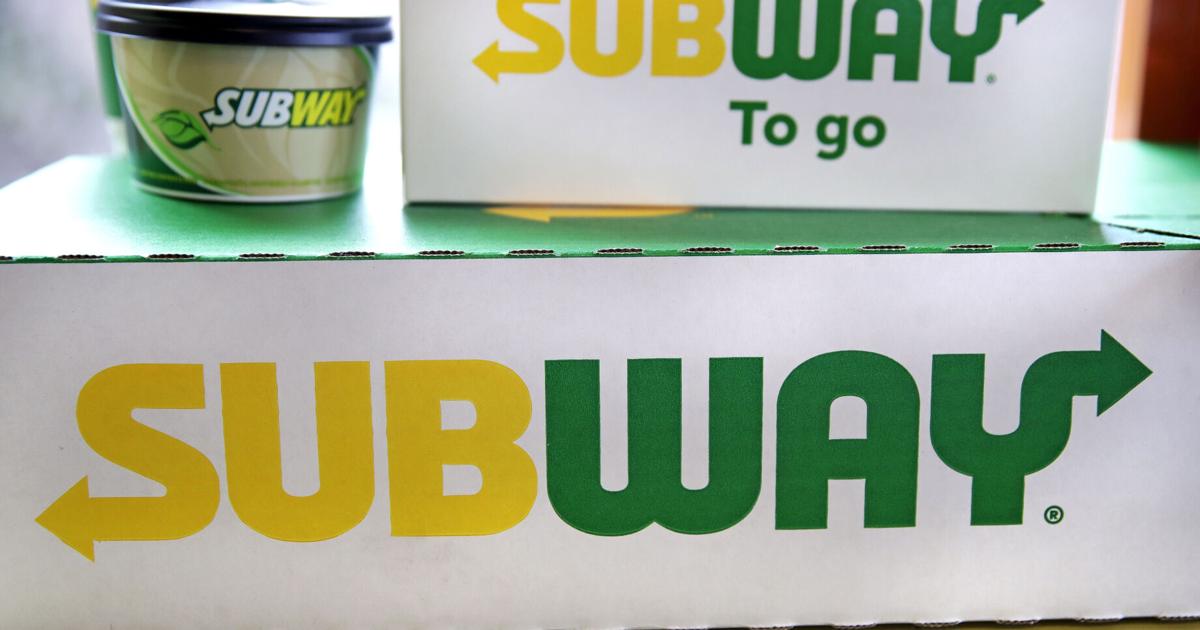
Private equity firm to buy Subway
Subway said Thursday it will be sold to Roark Capital, a private equity firm with expertise in restaurant management that could help the sandwich chain expand and improve its stores.
Terms of the deal weren’t disclosed. Earlier this week, The Wall Street Journal reported that Atlanta-based Roark was offering around $9.6 billion for Subway, which is privately owned.
Subway CEO John Chidsey, who joined the company in 2019, said the deal reflects Subway’s long-term growth potential and the value of the brand. Subway plans to continue to modernize restaurants and expand internationally under Roark’s ownership. Subway said its leadership team will remain in place.
Roark is a private equity firm with $37 billion in assets under management. It specializes in franchised businesses and backs two holding companies that own multiple restaurant chains: Inspire Brands, the parent of Arby’s, Dunkin’, Jimmy John’s and Buffalo Wild Wings; and Focus Brands, which owns Auntie Anne’s, Carvel, Cinnabon and Jamba.
Subway, which has dual headquarters in Miami and Connecticut, was founded in 1965 and is still owned by its founding families. It’s now one of the world’s largest restaurant chains, with 37,000 outlets in more than 100 countries.
Mortgage rates highest since ’01
LOS ANGELES — The average long-term U.S. mortgage rate climbed further above 7 percent this week to its highest level since 2001, another blow to prospective homebuyers grappling with rising home prices and a stubbornly low supply of properties on the market.
Mortgage buyer Freddie Mac said Thursday that the average rate on the benchmark 30-year home loan jumped to 7.23 percent from 7.09 percent last week. A year ago, the rate averaged 5.55 percent.
It’s the fifth consecutive weekly increase for the average rate, which is now at its highest level since early June 2001, when it averaged 7.24 percent. Back then, the median sales price of a previously occupied U.S. home was $157,500. As of last month, it was $406,700.
High rates can add hundreds of dollars a month in costs for borrowers, limiting how much they can afford in a market already unaffordable to many Americans. They also discourage homeowners who locked in low rates two years ago from selling.
Weekly jobless claims fall
WASHINGTON — Applications for unemployment benefits fell again last week as America’s labor market continues to hum along despite attempts by the Federal Reserve to cool the economy and bring down inflation that’s still higher than optimal.
The number of Americans applying for jobless benefits fell last week by 10,000, to 230,000 the week ending August 19, the Labor Department reported Thursday.
The four-week moving average of claims, a less volatile measure, rose by 2,250 to 236,750.
Jobless claim applications are seen as reflective of the number of layoffs in a given week.
In an attempt to bring down four-decade high inflation, the Federal Reserve raised interest rates 11 times in the past year-and-a-half to the current 5.4 percent, a 22-year high.
T-Mobile cutting 5k jobs
NEW YORK — Wireless carrier T-Mobile said Thursday it plans to cut 5,000 jobs, or about 7 percent of its workforce.
In email to employees shared in a regulatory filing, CEO Michael Sievert said the layoffs would come over the next five weeks and impact T-Mobile workers across the country — particularly those working in corporate and back-office roles, as well as some technology positions. Retail and customer service teams will not be part of the cuts.
“This is a large change, and an unusual one for our company,” Sievert wrote. “Because of this, we do not envision making additional largescale reductions across the company again in the foreseeable future.”
T-Mobile estimated it will book a pre-tax charge of about $450 million in the third quarter related to the job cuts. Laid-off employees will receive severance payments based on tenure, 60 days minimum of transition leave, career transition services and other benefits, Thursday’s announcement said.
Uber raises Calif. driving age
SAN FRANCISCO — Uber raised the minimum age requirement for most of its new drivers in California to 25 on Thursday under rules the company said are necessary because of the rising costs of commercial auto insurance in the state.
The new rule applies only to drivers signing up to transport passengers with Uber’s ride-hailing platform, and not for those delivering food with Uber Eats. Previously, people as young as 21 could sign up to drive customers, and the age limit for deliveries was 19.
Those under 25 who activated their accounts prior to Wednesday can continue to drive for Uber, the company said.
Insurance rates for Uber’s California drivers are significantly higher than for personal vehicles or taxi drivers, according to a company statement announcing the change.
